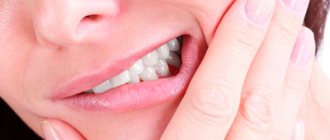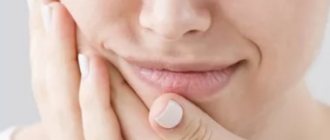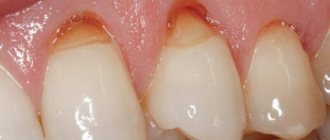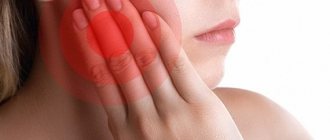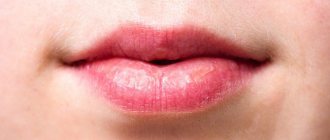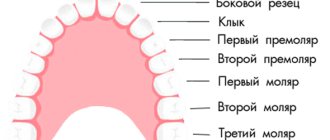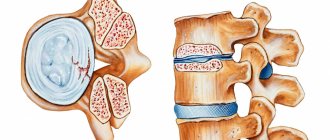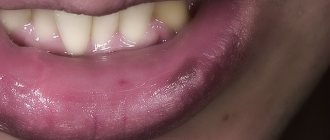Complications of bruxism
How the disease can be complicated if symptoms are ignored and intervention is delayed:
- hypertrophic changes in facial muscles;
- difficulties in mobility of the lower jaw;
- gingivitis, periodontitis, stomatitis;
- fibrosis of soft tissues;
- lichen planus on the mucous membranes of the oral cavity;
- malocclusion;
- carious lesions;
- grinding down teeth to the base;
- joint dysfunction;
- tooth loss;
- violation of facial aesthetics;
- depression, sleep problems.
What is bruxism
Bruxism, or uncontrollable teeth grinding, most often occurs during sleep. According to dentists, the teeth of the upper and lower jaws at rest should not touch each other except for episodes of eating.
This also includes strong clenching of the jaws as a result of spasms of the masticatory muscles (clanchus), including during the day (bruxomania). If we can still somehow cope with daytime grinding or compression by controlling it (although not always), then at night our “controller” mind turns off.
With the harmful bruxing process, the effect on the teeth can be called destructive. They wear out and loosen faster, the enamel becomes thinner, sensitivity increases, the bite is disrupted, resulting in cracks and chips appearing on the teeth. Gums also suffer, there is a risk of inflammation and the service life of installed fillings, implants and dentures is reduced.
Often, a patient with bruxism will wake up with tightly clenched teeth and a feeling of pain in the jaw, teeth, or facial muscles. Morning headaches and dizziness, ringing in the ears, pain in various parts of the spine, daytime drowsiness and a feeling of lack of sleep are also likely.
Special exercises and massage
Exercises and self-massage will help in the treatment of bruxism:
- Squeezing your jaw with your palms below on both sides, you need to press lightly with your fingers, massaging it in a circular motion. It is advisable to repeat such manipulations, which help relieve tension from the problem area, every day for at least 2-3 minutes.
- Chin muscle training. With your mouth slightly open, you need to push your jaw back with your fingers. The procedure is repeated several times during the day, at least 10 times in 1 approach.
- Chewing gum exercise. You need to roll the chewing gum balls from one corner of your mouth to the other. It is better to do this before going to bed, until you feel tired in your muscles, then the likelihood that your jaw will be clenched tightly in your sleep will sharply decrease.
USEFUL INFORMATION: Why do your legs twitch when you fall asleep?
Main causes of bruxism
- osteopathic (due to malocclusion, postural disorders, birth trauma or diseases of the cervical spine);
- dental (as a result of violations of the structure and functions of the dental system);
- neurological (due to disturbances in the functioning of the central and peripheral nervous system);
- psychological (due to the emotional state of a person, various manifestations of psychosomatics).
Let us dwell on the last reason in more detail, since, according to researchers of bruxism, psychological components influence its formation up to 70%.
How is the disease treated?
There are two main areas of treatment: protecting teeth and eliminating the cause of the disease itself.
To protect your teeth, your doctor may recommend wearing a mouth guard at night. If there are no malocclusions, one pair of mouth guards is made to be worn continuously while sleeping. Mouthguards made from individual tooth models accurately follow their shape and adhere very tightly. They cannot fly off during sleep; sleeping in them is completely safe.
Mouthguards protect teeth from contact and thereby relieve the symptoms of bruxism
If you have problems with your bite, you need to consult an orthodontist. After a complete examination, the doctor will be able to tell how long the treatment will last. In this case, you can also choose mouth guards (aligners), but you will need to wear them not at night, but all the time - up to 22 hours a day. Also, the aligners should be changed approximately once every 2 weeks for new ones with a new shape - this way they will correct the position of the teeth. Star Smile aligners are used to treat both adults and children.
Mouthguards are made of durable polymer material that does not damage teeth. Despite their small thickness (each mouthguard is less than 1 mm), they perfectly protect teeth from contact and prevent them from being damaged. And the closing of teeth in mouth guards is a little different in that there is space between the teeth, so you won’t be able to grind them anyway.
But braces are not recommended for patients with bruxism: there is a risk of damage to the system.
Another direction is to reduce the provoking psychological factor. It is possible to work with a psychologist to relieve stress, moderate physical activity, and normalize the daily routine. The fewer negative experiences, the easier it is to get rid of any “nervous” habit, and bruxism is no exception.
In severe cases, the disease can lead to inflammation of the temporomandibular joint, the appearance of crunching, clicking, and pain. Sometimes it becomes impossible to implement prosthetics. In this case, the treatment must be comprehensive, it is carried out by a dentist-gnathologist together with an orthodontist (if necessary).
A dentist-gnathologist deals with the diagnosis and treatment of all problems of the jaw apparatus.
It is easier to prevent the disease from developing to a serious stage. Even with slight signs of teeth grinding at night, it is better to consult a dentist and get advice on what to do to maintain dental health.
Who is susceptible to bruxism
The disease is often considered characteristic of people who are overly busy and busy, and is attributed to great psycho-emotional stress and stress in everyday life. This is not always the case - even adequately busy people can suffer from bruxism.
According to a survey of those seeking psychological help and concerned about bruxism, such patients do feel tension during the day. However, the level of this tension is quite optimal and necessary for most often performing intellectual work. Many clients have an optimistic character, but there is still a tendency towards workaholism. Most often, grinding at night was found in closed and secretive people who strive to keep all experiences and emotions to themselves (both positive and negative).
Also, according to observations, bruxism manifests itself in people with a strong sexual constitution, who do not always manage to fully realize their sexual potential. Probably, the accumulated tension could become a trigger for the manifestation of bruxism, as a release of energy at night due to unsatisfied activity. Because on the lips, which are related to the dental system, there are a huge number of sensitive areas.
Another hypothesis is that teeth grinding and jaw clenching can accompany patient people who keep all their passions, tears, resentments, anger and irritation within themselves due to their nature or lack of ability to express negative emotions. Anxiety, the presence of neurosis, unresolved internal contradictions and complexes can also cause the development of bruxism. Hippocrates also believed that “confusion of the soul is the main cause of teeth grinding.”
Strong-willed people, trying to gather strength and overcome fears, are subject to strong jaw clenching. A highly developed instinct of self-preservation also plays an important role here. The clenching of the jaws and teeth resembles an element of struggle or a defensive reaction, proving that the person is still alive.
Thus, the reasons for the persistence of bruxism may vary depending, including on age .
- For children, these may be protest reactions to the prohibitions or behavior of adults, parental divorce, moving, changing kindergarten or school;
- in adolescents - rebellion, suppression of anger and the desire to escape from the care of elders, uncertainty with the choice of profession or incorrect self-determination.
Reason #1: Stress
Scientists from the University of Dusseldorf conducted a study involving 48 subjects and proved that the main cause of bruxism is stress. In sleep, the body rests, cleanses itself and gets rid of unnecessary information, and clenching the jaw, a person continues to experience the troubles of the day at night. Constant nervous tension is a sure way to the development of this disorder.
INTERESTING FACTS!
- Representatives of the following professions are most susceptible to stress: surgeon, photojournalist, passenger plane pilot, realtor, manager.
- Dark chocolate, laughter and... good deeds help reduce stress hormones. The famous scientist Allan Lukes claims that after sincere, selfless help to strangers, a person experiences happiness and satisfaction. The body produces endorphins, it relaxes and gets rid of stress. This is also confirmed by a 30-year study that showed that women who cared about other people, and not just their family, were 2 times less likely to get sick and enjoyed life more.
USEFUL INFORMATION: Calf muscle cramps at night: causes, treatment, prevention
Treatment and prevention
Dentistry suggests constantly wearing a mouthguard - a custom-made rubber structure that protects teeth from abrasion and loosening.
magnesium, calcium and B vitamins, light sedative and hypnotic infusions in order to calm the nervous system Before going to bed, you can apply a warm, damp towel to relieve tension, and undergo massage sessions of the chin and jaw system.
You should avoid eating foods that stimulate the nervous system (chocolate, coffee, strong tea, energy drinks, chewing gum).
Psychological and physiological ways to overcome bruxism
- You can learn autogenic training methods, breathing exercises, meditation, relaxation and stress relief.
- You should make a list of your favorite calming activities that allow you to relax and switch your attention from worries (to form a so-called “ bank of positive emotions ”). This could be long walks in nature, playing a suitable sport (swimming, running, cycling, yoga or qigong), taking warm relaxing baths with herbal decoctions, listening to music, chatting in a pleasant company, watching interesting films or programs, reading books, traveling to new places.
- A visit to a psychologist or psychotherapist will help the patient speak out, understand himself, internal conflicts, frequent mood swings, overcome depression and find spiritual harmony and balance.
Patients with bruxism are often torn between reason and emotions, between “want” and “should.” As a result, a person seems to eat and strive to destroy himself, grinding his teeth in his sleep when control over the psyche is weakened. Bruxism manifests itself as a destructive form of auto-aggression (aggression that has not found a way out). And the task of the psychologist is to recognize and bring out, work through and make conscious to the patient these suppressed elements of his psyche (including through the use of hypnotic techniques). Find acceptable options for expressing suppressed emotions, allow the patient to realize himself, turning aggression into a constructive direction.
Also, with the help of a psychologist, you can learn useful relaxation skills, for example, according to Jacobson . This technique consists of alternately working with different parts of the body - tensing and then relaxing the muscles, including the maxillofacial muscles.
In case of an excess of sexual energy, it will be useful to think about having a partner and regularly realizing your sexual potential, which in itself brings positive emotions and relaxes.
Diagnosis of the disease in adults
Treatment cannot be started if the exact causes of the disease have not been established. In order to get a complete picture of the disease, it is necessary to undergo a thorough examination. When the first signs appear, consultations with specialized specialists will be needed:
- dentist;
- therapist;
- neurologist (neuropathologist) - for disorders of the nervous system;
- psychologist (psychotherapist) - if there are changes of a psychological nature;
- maxillofacial surgeon;
- otolaryngologist;
- somnologist, etc.
If teeth grind due to malocclusion, treatment of bruxism and rehabilitation should be carried out in dentistry. The same applies to persons with pathological abrasion of enamel, constant loss, cracks, chips and other defects. However, if a person has worn down the hard surfaces of their crowns, this does not mean that the jaw grinding habit is progressing at the moment. Perhaps these are just the consequences of interpersonal and individual problems left in the past.
Sometimes a polysomnographic study is indicated. During the procedure, contractions of the masticatory muscles are recorded while the patient is asleep. In this way, doctors can exclude epilepsy as one of the factors in the development of the disease.
An informative method is to use brooks checkers. These are special mouthguards for wearing at night, with the help of which it is possible to determine where the greatest tension is localized and how much the pathological process is related to the bite and the location of the dentition.
Using electromyography, the performance of muscle fibers is assessed at rest and during physical activity.
Who will save you from bruxism – a dentist or a psychologist?
Yes, bruxism is a problem, both psychological and dental. In the first case, the doctor may advise you to take a sedative, rest more, get enough sleep and avoid overexertion.
Dentists give more practical recommendations. If you have missing teeth, you need to fill the gap. Fortunately, dental implantation offers different ways to restore teeth in terms of time and money.
Fluoridation of teeth and the use of strengthening toothpastes to maintain enamel will help compensate for the aggressive consequences of bruxism.
Why does a child grind his teeth in his sleep?
First, let's understand the mechanism of the process. It is based on involuntary movements of the masticatory muscles. In a dream, a child clenches his jaws, his teeth touch and rub against each other, making a characteristic sound.
Another question is what these movements are connected with. All the reasons why a child grinds his teeth in his sleep can be divided into four large groups:
- General: fatigue, stress, lack of vitamins and microelements. The baby simply does not have time to relax in his sleep, and daytime tension results in hypertonicity of the facial and chewing muscles.
- Dental: bite problems and other pathologies. Simply put, something in the mouth is uncomfortable and causes muscle contractions.
- Neurological: sleep disorders, apnea, epilepsy.
- Mental: Autism, ASD and other problems often cause bruxism in children, in addition to the more obvious symptoms.
Of course, it’s definitely not worth giving a child a serious diagnosis just because he grinds his teeth. But it won’t be superfluous to review your daily routine, diet and visit a doctor - for starters, the dentist.
What to do if your child grinds his teeth in his sleep
In addition to the above, the following measures can be taken:
- Review your daily routine. If you suspect that your child is overtired, reduce the load. For example, pause clubs and sections, discuss attitudes towards school performance, and in general, do not overload the child’s nervous system.
- If a child grinds his teeth in his sleep after moving, changing schools or other significant events, give him time to get used to it. Be sure to ask about possible problems and discuss how best to proceed.
- If the child is very impressionable, consider the option of mild sedatives, and establish a sleep and rest routine.
- Check the level of calcium and magnesium, and if necessary, add foods or medications rich in these microelements to your child’s diet.
- Make sure your child sleeps comfortably and soundly. A good mattress, comfortable pajamas, and fresh air do not completely eliminate bruxism in children, but they help reduce nighttime tension.
What not to do:
- Diagnose your child yourself, especially serious ones. Remember: if a child grinds his teeth at night, this is not an illness.
- Run to the pharmacy for pills against internal parasites. We repeat: no connection has been identified between worms and night teeth grinding. Parasites can aggravate the condition, as they also cause discomfort at night, but they are definitely not the cause of bruxism.
- Wake up the child and prohibit him from grinding his teeth. He simply will not understand what you are talking about, since he does not realize and does not remember what he did.
- Look for how to remove teeth grinding in your sleep at one time. There are no such recipes.
Bruxism is a problem that lies at the intersection of dentistry, neurology, and gastroenterology. In serious cases, it may be necessary to visit several specialists and change several treatment regimens. At the same time, this is a fairly typical problem. Start with a visit to Mira dentistry. Together we will try to figure out why the child grinds his teeth and how we can help him.
Treatment approaches
The disease is treated through the joint efforts of neurologists and dentists. The main goals of therapy are the elimination of stress, local manifestations of pathology, and the prevention of complications on the masticatory apparatus. A combination of means and methods is used:
- pharmacotherapy - muscle relaxants, antioxidants, vitamins, amino acids, sedatives;
- physiotherapy;
- psychotherapy;
- treatment of snoring, apnea.
Dental intervention consists of correcting the bite, periodontal damage, making removable aligners, and splinting. The extent of intervention depends on the severity of the violations. In advanced cases, surgical reconstruction may be required.
It is important to identify adolescent bruxism in the early stages to prevent serious consequences.
